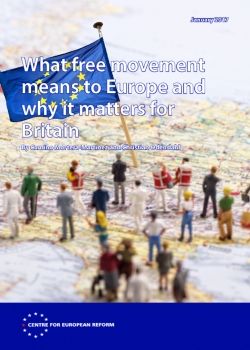
What free movement means to Europe and why it matters to Britain
Britain and the EU view EU migration differently. While EU free movement rules have been a toxic political issue in Britain for years, many on the Continent consider them a core achievement of the EU. Continental Europeans do worry about migration, but mostly about migration from outside the EU.
Britain voted to leave the EU largely because of the unpopularity of unrestricted EU migration. Negative views of free movement have been fuelled by misleading media stories and a perceived mismatch between the British labour market and social security system, and those of most other member-states.
- Britain and Europe’s different perceptions of EU migration will complicate the Brexit talks. European leaders believe that compromising on free movement would endanger the EU project. They fear that making concessions on free movement would embolden governments to call for a dilution of other single market rules.
- In her ‘Brexit speech’, Theresa May said that Britain would not be seeking access to the single market because London understands that for the EU, the ‘four freedoms’ are indivisible, and because Britain seeks control of migration.
- Britain and the EU will still need to agree on the rights of existing EU migrants, which May vowed to protect, and on migration rights as part of a future free trade agreement. In negotiating the latter, the EU may well insist on at least preferential access of EU workers to the British labour market, if not more.
- If they want to get a good deal, Brussels and London should move away from pre-conceived, emotional notions of EU migration. For that, Britain and the EU should walk into Brexit negotiations with a clear idea of what migration means for the other – both legally and politically. Britain should accept that for the EU-27, the idea of free movement is not just political posturing, but an essential part of the single market.
- Free movement is a founding principle of the EU, enshrined in the treaties in 1957. But it is not an unconditional right. To be lawfully resident in another member-state, EU citizens need to be working, studying, or able to prove that they are self-sufficient.
- The ECJ had an important role in turning the abstract principle of free movement into practical case law. Until recently, the ECJ was stretching its mandate to the limit and extending the right of free movement beyond what member-state governments had intended.
- With the rise of populism and the EU’s sagging popularity, the era of extending free movement rights has come to an end – just as the UK is leaving the EU. For example, recent rulings by the ECJ have set tougher limits on EU citizens’ access to social benefits when living in another member-state.
- Basic economic theory suggests that the single market could work without free movement of labour. If goods, services and capital are free to move across borders, there would be no additional economic benefit from allowing workers to relocate.
- This simple theory excludes other aspects of international trade. Exporters and importers need detailed knowledge about the country they are trading with. Migrants have been shown to be effective economic bridges to other countries, facilitating trade and investment, especially in services. Workers can also gain skills and experience if there is a broader set of jobs to choose from. And firms can more easily address shortages of skilled labour if the pool of candidates is larger.
- The EU is unlikely to agree on major changes to free movement rules in the next few years. The main point of contention is access to benefits by non-working EU migrants, but the ECJ has recently confirmed the right of EU countries to restrict it. There is little appetite to review the rules now, at a time when the EU-27 needs to offer a united front vis-à-vis the UK.
- However, once the Brexit deal is done, Brussels should get serious about addressing the perceived unfairness of free movement rules. For that, the EU should try to close the gap between the rhetoric of free movement and the much less impressive reality. The European Commission may want to look at ways to make it easier for EU citizens to work in other member-states, for example by making sure that professional qualifications are recognised elsewhere.
- The EU should also consider some modest reforms to free movement, to avoid further stoking populist hostility to EU migration. These reforms could include a revision of who can access benefits; some reforms on child benefit rules; and slight amendments to the rules on non-EU partners of EU citizens.


Comments
Many britons understandably don't quite comprehend Europeans attachment to free movement. To bring it closer to home, imagine the damage to commerce if there were no free movement between England and Scotland.